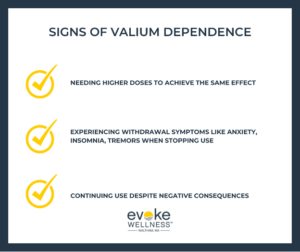As prescription drug abuse rises, many are turning to medications like Valium for nonmedical reasons. Understanding how long Valium stays in your system is crucial, especially if you or a loved one struggles with addiction. Recent statistics show a 30% increase in Valium prescriptions nationwide, underscoring the importance of proper use. This article provides key facts about Valium and its effects, including:
- How long Valium is detectable in urine, blood, saliva, and hair
- Factors like dosage, frequency, age, and metabolism that influence detection times
- Withdrawal symptoms and how long they last
- Treatment options like inpatient rehab, outpatient programs, therapy, and 12-step groups
- The importance of professional help and a customized treatment plan for recovery
Armed with this knowledge, you can make informed choices about Valium use and get needed support if dependency becomes a problem.
Together, let’s embrace the journey to recovery and the promise of a new beginning. Call us at (833) 287-7223 today or reach out online.
What Is Valium?
A Popular Benzodiazepine
Valium, the brand name for diazepam, is one of the most widely prescribed benzodiazepines in the United States. It’s used to treat anxiety disorders, panic attacks, insomnia, muscle spasms, seizures, and alcohol withdrawal symptoms.
How It Works
Diazepam works by enhancing the effects of gamma-aminobutyric acid (GABA) in the brain. GABA is an inhibitory neurotransmitter that slows down hyperactivity, inducing a calming effect to relieve anxiety and stress.
Misuse and Addiction Risks
While intended for short-term use, diazepam carries a high risk of dependence and addiction with prolonged misuse. Long-term use can damage organs like the brain and kidneys, and quitting abruptly after dependence sets in can trigger severe withdrawal symptoms.
Medically supervised detox and addiction treatment programs are often required to safely discontinue diazepam and prevent relapse.
How Long Does Valium Stay in Your System?
Valium’s Prolonged Effects
Valium, also known as diazepam, is a long-acting benzodiazepine medication. According to Evoke Wellness, it has a half-life of around 48 hours. This means it takes roughly 2 days for half the dose to be expelled from your body. However, the duration Valium stays in your system can vary widely depending on individual factors.
Factors Influencing Duration
- Age and body composition
- Metabolic rate and overall health
- Kidney and liver function
- Dosage amount
- Poly-substance use
Absorption Rate Variations
The rate at which Valium is absorbed also impacts how quickly its effects are felt. As noted by Evoke, when taken orally on an empty stomach, over 90% is absorbed within 15 minutes. However, if taken with food, this can extend to 45 minutes before the full effects kick in.
Risks of Long-Term Use
While Valium can be helpful for insomnia, prolonged use increases risks of physical dependence, withdrawal symptoms, cognitive impairment, and potential organ damage like kidney issues identified in rat studies. Evoke emphasizes medical detox and therapy for full recovery from long-term Valium use.
Who Should Not Take Valium?
Pregnancy Risks
Pregnant women should avoid taking Valium as it may harm the fetus. Benzodiazepines like Valium can cause dependency in the baby if taken during pregnancy, leading to potential withdrawal symptoms after birth.
Respiratory Issues
Those with respiratory problems like sleep apnea, asthma or COPD should not use Valium. It can suppress breathing by depressing the central nervous system, worsening existing respiratory conditions.
Liver Impairment
Individuals with liver impairment or disease should avoid Valium usage. The liver metabolizes Valium slowly in these cases, causing accumulation and increasing overdose risks.
Elderly Population
The elderly are also at higher risk of side effects from Valium due to age-related changes in drug metabolism and sensitivity. It can cause drowsiness, dizziness and increase fall risks in older adults.
History of Addiction
Those with a history of drug or alcohol addiction should not take Valium due to its high potential for dependence. Withdrawal may also be severe, worsening existing addiction issues.
What Are the Side Effects of Valium?
Common Side Effects
Diazepam, sold under the brand name Valium, is a benzodiazepine that can cause various side effects. The most common side effects include drowsiness, dizziness, confusion, headaches, and difficulty concentrating. It can also impair motor skills like driving abilities.
Onset and Duration
The onset of Valium’s effects usually occurs within 30-60 minutes after oral administration. However, the peak effects may take 1-2 hours. Due to its long half-life, the lingering side effects can persist for up to 48 hours after use.
Withdrawal Risks
With long-term use, sudden discontinuation of Valium can lead to withdrawal symptoms like insomnia, anxiety, tremors, nausea, and in rare cases, seizures. Medical supervision is crucial during benzodiazepine withdrawal to prevent complications.
What Is Valium Dependence?
Valium (diazepam) is a benzodiazepine medication prescribed for anxiety, insomnia, and other conditions. While effective, long-term or high-dose use can lead to physical dependence. This means your body adapts to the drug, resulting in withdrawal symptoms if you suddenly stop taking it.
Safe Withdrawal Process
Abruptly stopping Valium can trigger dangerous rebound effects like seizures. It’s crucial to taper off slowly under medical supervision. Your doctor can provide a customized tapering schedule to safely manage the withdrawal process and transition you off Valium dependence.
How to Stop Taking Valium Safely
Stopping valium (diazepam) abruptly after developing dependence can lead to dangerous withdrawal symptoms like seizures, tremors, anxiety and insomnia. A medically supervised detox is recommended to safely taper off valium and minimize complications.
Supervised Detoxification
During detox, medications like pregabalin may be used to help manage acute withdrawal symptoms and lower seizure risk. Pregabalin works rapidly to calm overactive nerves driving severe valium withdrawal effects.
Ongoing Treatment
After detox, continuing treatment is crucial to address the root causes of addiction and prevent relapse. Options include:
- Intensive outpatient program
- Psychotherapy
- 12-step facilitation
- Mindfulness-based therapies
With comprehensive care addressing mind and body, individuals can heal, develop coping strategies, and sustain long-term recovery.
FAQs About Valium Addiction Treatment Programs
What Are Common Treatment Options?
Valium addiction requires a comprehensive treatment approach. Medically supervised detox helps manage withdrawal symptoms safely. Inpatient or residential programs provide 24/7 care and support. Intensive outpatient programs allow patients to live at home while receiving treatment services.
What Therapies Are Used?
Cognitive-behavioral therapy (CBT) helps modify harmful thought patterns and behaviors linked to addiction. Dialectical behavior therapy (DBT) teaches mindfulness and coping strategies. Family therapy heals relationships impacted by addiction. Holistic approaches like meditation, yoga, and art therapy promote overall wellness.
Do I Need a 12-Step Program?
12-step programs offer peer support and promote spiritual growth as part of the recovery journey. They empower individuals to make lifestyle changes and avoid relapse through continuous self-work. Many treatment centers incorporate 12-step philosophies or offer program referrals.
Conclusion
You now have a better understanding of how long Valium stays in your system. While the effects of Valium vary for each individual, be mindful of building a dependence. Consider speaking with a medical professional if you feel you need help managing your Valium use. Programs like Evoke Wellness at Waltham’s drug addiction treatment can aid you through counseling, therapy, and support groups. Make your health and wellbeing the priority. With the right tools and guidance, you can overcome prescription drug addiction. The path to recovery starts with you.
Begin Your Journey with Evoke Wellness at Waltham
If you or a loved one is considering outpatient treatment, Evoke Wellness at Waltham invites you to contact us. Our compassionate team is ready to answer your questions, discuss your needs, and help you take the first steps toward recovery. At Evoke Wellness, you will find more than just a treatment program – you’ll discover a community dedicated to your wellness and success. Together, let’s embrace the journey to recovery and the promise of a new beginning. Call us at (833) 287-7223 today or reach out online.



